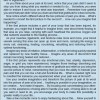Headache is a very common complaint with over 90% of all persons experiencing a headache at some time in their lives. Headaches commonly are tension-type (TTH) or migraine. They have high socioeconomic impact and can disturb most daily activities. Treatments range from pharmacologic to behavioral interventions. In a study published online today in the Journal […]








Recent Comments